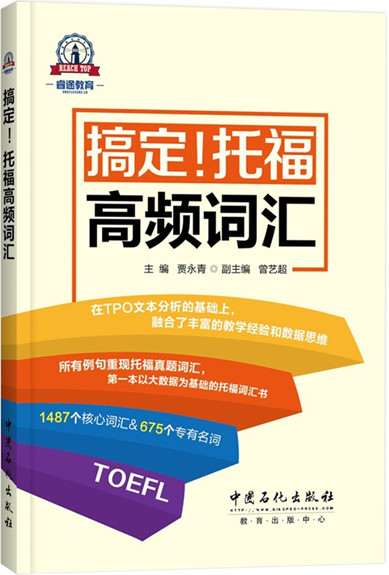2018年托福阅读练习试题:美国十九世纪的政治
NINETEENTH-CENTURY POLITICS IN THE UNITED STATES (OG)
The development of the modern presidency in the United States began with Andrew Jackson who swept to power in 1829 at the head of the Democratic Party and served until 1837. During his administration, he immeasurably enlarged the power of the presidency. "The President is the direct representative of the American people," he lectured the
Senate when it opposed him. "He was elected by the people, and is responsible to them." With this declaration, Jackson redefined the character of the presidential office and its relationship to the people.
During Jackson's second term, his opponents had gradually come together to form the Whig party. Whigs and Democrats held different attitudes toward the changes brought about by the market, banks, and commerce. The
Democrats tended to view society as a continuing conflict between "the people”-farmers, planters, and workers-and a set of greedy aristocrats. This "paper money aristocracy" of bankers and investors manipulated the banking system for their own profit,Democrats claimed, and sapped the nation's virtue by encouraging speculation and the desire for sudden, unearned wealth. The Democrats wanted the rewards of the market without sacrificing the features of a simple agrarian republic. They wanted the wealth that the market offered without the competitive, changing society; the complex dealing; the dominance of urban centers; and the loss of independence that came with it.
Whigs, on the other hand, were more comfortable with the market. For them, commerce and economic
development were agents of civilization. Nor did the Whigs envision any conflict in society between farmers and
workers on the one hand and businesspeople and bankers on the other. Economic growth would benefit everyone by raising national income and expanding opportunity. The government's responsibility was to provide a well-regulated economy that guaranteed opportunity for citizens of ability.
Whigs and Democrats differed not only in their attitudes toward the market but also about how active the central government should be in people's lives. Despite Andrew Jackson's inclination to be a strong President, Democrats as a rule believed in limited government.
Government's role in the economy was to promote competition by destroying monopolies' and special privileges. In keeping with this philosophy of limited government, Democrats also rejected the idea that moral beliefs were the proper sphere of government action. Religion and politics, they believed, should be kept clearly separate, and they generally opposed humanitarian legislation.
The Whigs, in contrast, viewed government power positively. They believed that it should be used to protect
individual rights and public liberty, and that it had a special role where individual effort was ineffective. By regulating the economy and competition, the government could ensure equal opportunity. Indeed, for Whigs the concept of
government promoting the general welfare went beyond the economy. In particular, Whigs in the northern sections of the United States also believed that government power should be used to foster the moral welfare of the country. They were much more likely to favor social-reform legislation and aid to education.
In some ways the social makeup of the two parties was similar. To be competitive in winning votes, Whigs and
Democrats both had to have significant support among farmers, the largest group in society, and workers. Neither party could win an election by appealing exclusively to the rich or the poor. The Whigs, however, enjoyed disproportionate strength among the business and commercial classes. Whigs appealed to planters who needed credit to finance their cotton and rice trade in the world market, to farmers who were eager to sell their surpluses, and to workers who wished to improve themselves. Democrats attracted farmers isolated from the market or uncomfortable with it,
workers alienated from the emerging industrial system, and rising entrepreneurs who wanted to break monopolies and open the economy to newcomers like themselves. The Whigs were strongest in the towns, cities, and those rural areas that were fully integrated into the market economy, whereas Democrats dominated areas of semisubsistence farming that were more isolated and languishing economically.
美国现代总统制度的发展是从安德鲁杰克逊开始的。这位民主党领导人在1829 年掌权,直至1837 年卸任。在他任职期间,总统的权力被无限量地扩大了。参议院反对他时,他曾说:“总统是美国人民的直接代表,美国总统由公民选举产生,对公民负责。”杰克逊用这番话重新定义了内阁的 角色,及其与民众的关系。
在杰克逊的第二任任职期间,他的反对者们逐渐联合起来形成了辉格党。辉格党和民主党在市场、银行、商业引发的变化上持有不同的态度。民主党倾向于把社会视作平民(农民、种植园主、工人)和一小撮贪婪的贵族间持续的斗争。他们宣称,那些银行家和投资者们都是“钞票贵族”,他们在自己利益的驱使下操纵着银行系统,并且以鼓励投机和迅速赚取不义之财的行为败坏国民道德。民主党人既想从市场经济中获得好处,又不想牺牲单一土地所有权的共和体制。他们想要市场经济带来的财富而不想要竞争,不想改变社会;不想要复杂的交易;不要大城市的主宰和随着市场经济而来的独立性的丧失。
另一方面,辉格党对市场更为适应。对于他们来说,商业和经济的发展是文明化的动力。然而,辉格党人并没有预见农民、工人和商人、银行家之间的冲突。他们认为,经济发展会通过增加国民收入和就业机会使每个人受益。政府的职责就是提供一个井然有序运作良好的经济环境,保证给每一个有能力的公民机会。
辉格党和民主党的分歧不仅表现在对市场的态度上,而且表现在中央政府究竟该在人民生活中起到多少作用上。抛开安德鲁杰克逊想做一个强势总统不谈,民主党本身就主张限制政府的做法。政府在经济中的角色就是通过摧毁垄断和特权来鼓励竞争。为了遵循限制政府的做法,民主党人同样否定 了道德准则属政府行为的范畴。民主党人确信,宗教和政治应划清界限,而大体上,他们也反对人道主义立法。
相反地,政府权力在辉格党人眼中是积极的。他们认为,应该用政府权力保护个人权力和公众自由,在个人努力无效时扮演特殊角色。通过规划经济和竞争,政府可以保证机会平等。确实,辉格党的政府促进公众福利超过了促进经济。特别是,美国北部的辉格党还认为政府力量应该用来推广国家的道德福利。他们更加偏好社会改革法案和补助教育。
两个政党在社会结构、人员构成上具有某种程度的相似性。为了在投票中更具竞争力,辉格党和民主党都要在社会最大群体即农民和工人当中获得大力支持。任何一个党派若只讨好穷人或富人都不可能赢得选举。然而,辉格党偏好把精力花费在商业阶层上。辉格党博得了需要信用来贷款以在世界贸易中出售棉花和米的种地的人、渴望卖出余粮的农民和希望改变现状的工人的喜好。民主党则吸引了隔离于市场外或不习惯市场的农民、工业系统外的工人和想打破垄断开发新市场的新兴小企业家的欢心。辉格党在城镇市区还有完全融入市场经济的农村区域很强势,而民主党主宰了与市场隔绝,经济日渐衰微的半自给农耕地区。
- 05-22·2018年托福阅读练习试题汇总
- 05-11·2018年托福阅读材料之天文常识
- 04-06·2018年托福考试阅读试题(二)
- 04-05·2018年托福考试阅读试题(一)
- 03-31·2018年托福阅读练习试题:美国汽车城底特律
- 05-222018年托福阅读练习试题汇总
- 05-112018年托福阅读材料之天文常识
- 02-102018年托福阅读模拟试题汇总(15套)
- 11-302017年托福阅读模拟试题汇总
- 11-242017年托福阅读模拟试题:费城
编辑推荐
- 模拟试题
- 历年真题





